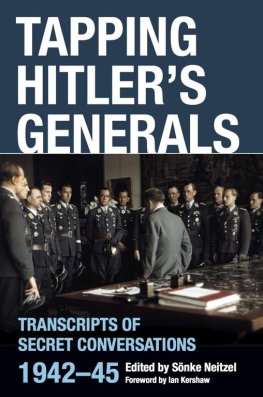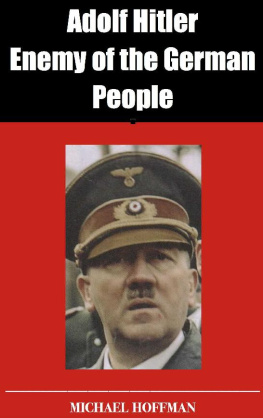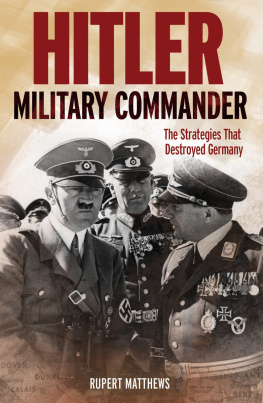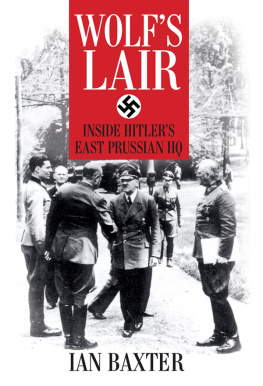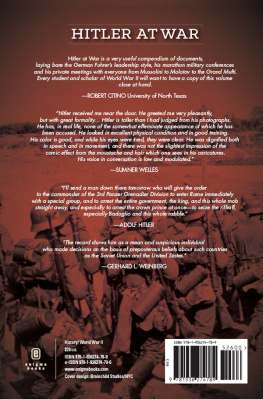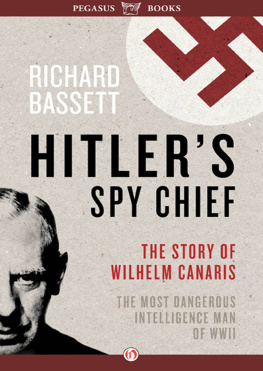Snke Neitzel
TAPPING HITLERS GENERALS
TRANSCRIPTS OF SECRET CONVERSATIONS 194245
Long after 1945, what has been called the legend of the unblemished Wehrmacht, which claimed to have remained largely detached from the criminality of the Hitler regime and the atrocities attributable to the SS, still survived. This was to some extent an indication of the limited state of research (and a tendency to separate the military history of the war from the structural analysis of the Nazi state). The legend was shored up, too, by the postwar memoirs of leading military figures, who sought to uphold the honour of the Wehrmacht and at the same time to exculpate themselves. But the sustenance of the legend also had political and social underpinnings. It fitted the interests of the young Federal Republic of Germany (especially when it acquired its new army, the Bundeswehr, in 1955), and of the Western Allies in the early years of the Cold War. And, not least, it accorded in part with a readiness (in some ways perhaps a necessity) among many ordinary people to believe that the deep stain of Nazism had not permeated absolutely everything, that the armed forces in which fathers, brothers, uncles and friends had served, had fought honourably for their country.
Over time, the legend was certainly eroded. Few specialist historians of the Third Reich had ever fully subscribed to it, and their work had at the latest since the 1960s started to implicate the Wehrmacht in the worst crimes against humanity perpetrated by the Nazi regime. But little of this had penetrated far into public consciousness. In the 1990s, however, one of the heated and emotional public debates about the Nazi past that periodically punctuated the politics and culture of the Federal Republic exploded the myth completely. A major exhibition on the Wehrmacht, entitled War of Annihilation. Crimes of the Wehrmacht, 19411944, which started its tour of major German cities in 1995, completely broke the image of an army which had kept its hands clean. Much in the exhibition was new, and shocking, to the wider public. The controversy that arose spawned a flood of publications, ranging from specialist research monographs to magazine articles, from written eyewitness accounts to television documentaries, which now made it impossible for a younger generation to hold on to notions of a blameless Wehrmacht that had fought a normal war while Nazi organisations, above all the SS, had perpetrated the crimes. These younger Germans had to face up to the unpleasant fact that their grandfathers, serving in the regular army, not the SS, might well have been implicated in terrible barbarities.
Sparked in part by the Wehrmacht Exhibition, a great deal of research in recent years has immensely extended and clarified an understanding of mentalities and patterns of behaviour within the Wehrmacht during the Nazi era, and especially during the World War II. How far the Wehrmacht accepted or rejected Nazi ideological aims has been at the centre of a good deal of the work. Much of the attention has focused on the complicity of the Wehrmacht in the Nazi regimes gross crimes against humanity, notably in Eastern Europe and on the territory of the former Soviet Union, and quite especially in the genocide against the Jews. A central question has been how much guilt the Wehrmacht, from its commanders-in-chief down to ordinary soldiers, carried for these crimes. And, related to these themes, the question of the stance of the Wehrmacht in the dying phase of the Nazi regime, when it was obvious that the war was lost, has been a key issue. Why, even in these last terrible months of the war, which cost the lives of such a relatively high proportion of the total numbers of victims, did the Wehrmacht continue to fight so doggedly in a patently lost cause? What was the attitude within the armed forces towards Hitler and the Nazi leadership, and to those who tried to put an end to the regime (most notably in the bomb-plot of 20 July 1944)? These questions still invite no easy or black-and-white answers.
If anything, answers are even harder to come by with regard to those who held command positions in the armed forces, carrying a high share of responsibility for the Wehrmachts actions in the Third Reich, than they are for ordinary soldiers. German generals were in their postwar memoirs unsurprisingly anxious to distance themselves from Hitler and the Nazi leadership, to demonstrate their unpolitical concern to carry out their duty as soldiers, and often to underline their own resistance credentials (or at the very least criticism of the actions of the regime while emphasising their powerlessness to alter them). Personal papers, diaries and letters have, of course, often proved valuable, where they survive, in casting light on the contemporary attitudes of specific individuals. But in most cases they do not survive. And official military records for the most part betray little of the genuine political stance of those who compiled them. So it is probably true to say that fewer notable advances in research have been made into the mentality of higher officers of the Wehrmacht than in the case of rank-and-file soldiers.
This is why this impressive edition put together by Snke Neitzel is so valuable. He has uncovered and examined an unusual, and most revealing, source: the transcriptions of the bugged private conversations of high-ranking German officers in British captivity made by the Combined Services Detailed Interrogation Centre at Trent Park, near Enfield in Middlesex, and now kept in the National Archives (formerly the Public Record Office) in London. Unlike the countless postwar interrogations, in which those being interrogated could conceal or distort a great deal in the answers they gave to specific questions by their captors, these were unstructured conversations freely held among Germans themselves, touching upon most sensitive issues relating to attitudes towards the German leadership and knowledge of war crimes. And, as Professor Neitzel demonstrates, the conversations were openly carried out without any awareness that they were being overheard and recorded. Moreover, the bugging of the German officers conversations dates back to 1942. That is, their recorded views derive not from a time when Hitlers Germany already lay in ruins. They were not retrospective assessments of a fallen regime made with a careful eye on avoiding incriminating statements that could be used in a court, but were contemporary comments among more or less equals which offer a unique insight into the thinking of German generals and other officers of high rank long before the regime collapsed.
Professor Neitzel points out that the prisoners of war whose views he has assembled for us are not a representative sample of German officers. The first prisoners were taken in North Africa in 194243 and there was a continuing influx after the D-Day landings in June 1944 and the subsequent battles in Normandy, down to the push into the Reich itself. The experience of the Eastern Front, where of course the worst of the fighting and worst of the atrocities (including the slaughter of the Jews) took place, was limited for many of the prisoners whose words are recorded here. Even so, most of those captured had served on various fronts, often including the east, and some of them were ready and able to speak of terrible atrocities which they witnessed. If not representative in any scientific fashion, the German officers views reproduced in this volume are certainly indicative of a wide spectrum of opinion, ranging from diehard Nazi attitudes to long-held, outrightly oppositional stances.
The polarisation of attitudes towards Hitler and the Third Reich is most plainly demonstrated, as Professor Neitzel shows, in the strongly maintained views of the very first two prisoners, General Thoma (anti-Nazi) and General Crwell (an ardent supporter of the regime). An interesting facet of the edition is the way these two became the focal points of cliques, dividing largely on political or ideological lines. Professor Neitzels findings indicate that no obvious sociological or denominational differences determined the shaping of Nazi or anti-Nazi stances, but that the crucial factor was the specific experience of the war, coupled with a varying readiness among the individual officers to reflect critically on the recent past.

